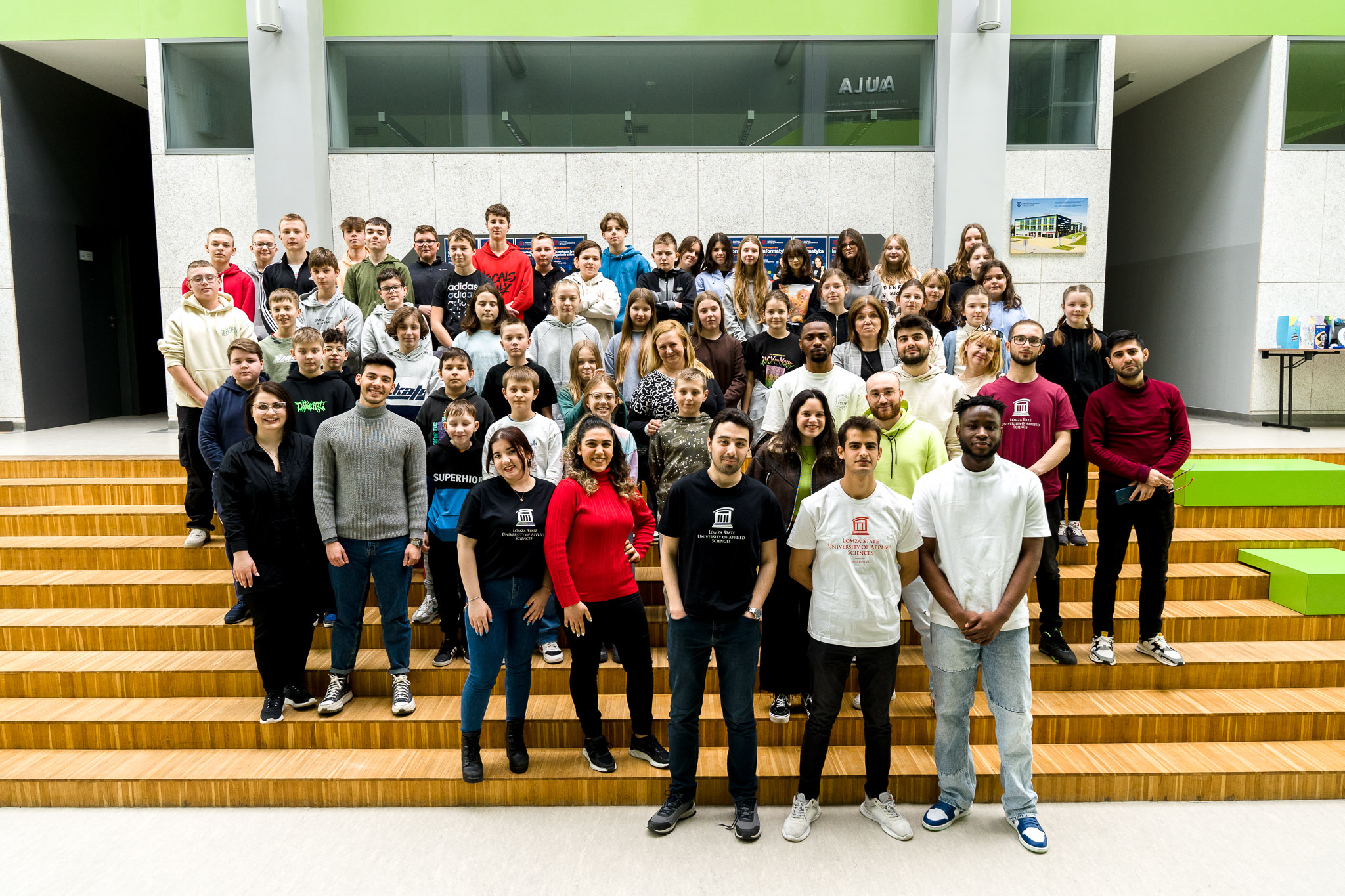Logistics
Departmental Erasmus+ Coordinator: PhD, Eng. Rafał Melnik
e-mail:
Degree structure: first-cycle (3.5 years, 7 semesters)
Mode of study: full-time and part-time
Graduates possess modern knowledge and practical skills in managing the flow of goods, information, and resources. They are prepared to design, plan, and optimize logistical processes within enterprises and across entire supply chains. The curriculum covers key areas such as transportation, forwarding, warehousing, inventory management, and the use of modern IT systems in logistics.
Specialisations:
- Transport Logistics
- Information Technologies in Logistics
- Agri-Food Industry Logistics
Degree awarded: Bachelor
Courses offered for the 2025/2026 Academic Year:
IICHD
The International Institute of Child Development Foundation is a young organization that cares for the development of children and youth in 4 areas: intellectual, physical, mental and spiritual.
It was created as a response to the challenges of our times and the everyday problems of children in Europe and Africa. While our children have almost everything materially, they lack what children in Africa have in abundance - the joy of every day and interpersonal relationships. In turn, most African children have never had their own book, even though reading and learning are their dreams and a chance for a better future. The Foundation wants to connect people from continents to discover the satisfaction of sharing the best of what they have through:
The Foundation builds Librafrica development centers for children from the poorest parts of Africa, conducts adoption, feeding and purchasing solar lamps, and locally in Europe engages young people in the development of gratitude, humility and passion for life through various projects in the education of sustainable development and the Millennium Development Goals.
IIChd helps also children from Ukraine to cope with the consequences of the war.
Summary of IICHD's actions: Fundacja MIRD 2023
Faculty of Law and Administration
The Dean
PhD Ewa Jakubiak
e-mail:
Faculty Erasmus+ Coordinator
PhD Łukasz Buczkowski
e-mail:
The Faculty offers the following programmes:
Administration
Departamental ERASMUS+ Coordinator:
PhD Łukasz Buczkowski
e-mail:
Mode of study: full-time and part-time
Degree structure: first-cycle (Bachelor’s degree)
Programme: 3 years (6 semesters)
Development paths:
- Administration of state and local government entities
- Administration in business
- Administration for security
Degree structure: second-cycle (Master’s degree)
Programme: 2 years (4 semesters)
Specializations:
- Public administration
- Social assistance and healthcare administration
- Mediation in administration
Administration is a field that offers a wide range of employment opportunities. It prepares for employment in public administration institutions and in local self-government units. Administration graduates, upon leaving the walls of our School, will succeed in the political and local government activities as well as they will be ready to run their own business.
Law
Departmental Coordinator:
PhD Łukasz Buczkowski
e-mail:
Mode of study: full-time, part-time
Degree structure and programme: 5 year Master’s studies (10 semesters)
There are three main development paths you can choose:
- Civil-economic law
- Criminal law
- Mediations and administration
The aim of the programme is to provide students with the knowledge of legal sciences and the skill to apply this knowledge in practice. Graduates in this field will be theoretically and practically prepared to work in the judicial system, legal services for business entities, notary services, government and local self-government institutions, as well as in many other professions connected with establishing or applying laws. They will be also prepared to start judicial, prosecutorial training or any other training for legal professions and to work in both state and private institutions and organizations which require the extensive knowledge of law.
Full-time Programmes in English
Welcome to the Online Candidate Admission System of University of Lomza
Check our offer
How to apply
In the News menu you will find current messages related to the admission process. In the Offer and Units menus you will find the current didactic offer of University of Lomza. You can find a list of all programmes along with the admission periods in the Admissions menu. New candidates must first register their account by clicking create account.
The process of registering a new account requires acceptance of the information clause related to the protection of personal data and confirmation of registration of a new account using the activation link provided in the e-mail. If the activation link message is not visible in the incoming mail, check the contents of the spam folder.
Candidates who already have an account have to log in
General conditions of study for foreigners
Candidates for the first-cycle programmes will:
- have a Polish matura certificate or another legalised or apostilled document obtained abroad entitling them to apply for admission to programmes at universities of any type in the country in which the institution issuing the certificate operated, recognized as equivalent to the relevant Polish matura certificate, in accordance with relevant regulations or on the basis of international agreements
- demonstrate the special predispositions required in the receiving university to start programmes requiring such predispositions.
A secondary-school leaving exam (matura) certificate/university diploma must be legalized, translated and recognized in Poland as equivalent to the relevant Polish certificate / diploma. The exceptions are certificates/diplomas of higher education institutions from Austria, for which – on the basis of a separate agreement on legal cooperaton – the apostille and the diploma of International Baccalaureate are not required.
Regulations of the Admission Procedure
Legalization of certificate/diploma
- Legalization is a confirmation of the formal compliance of the document with the law of its place of issue or the authenticity of signatures and stamps placed on the document. The legalisation of such a document can therefore be important in determining which country's education system issued the document and whether it should be verified as authentic. In some countries, as in Poland, internal regulations oblige the holder of a diploma to legalize it before it is removed from the country of issue. If the document is legalized by the relevant institutions of the country in which it was issued, this increases its credibility.
- Legalization of a secondary-school leaving exam certificate/higher education diploma may be made by:
- the consul of the Republic of Poland, competent for the country in whose territory or education system the certificate was issued, or
- the educational authorities of the State in whose territory or in whose education system the certificate was issued, or
- accredited in the Republic of Poland or another Member State of the European Union, a Member State of the European Free Trade Agreement (EFTA) – a party to the agreement on the European Economic Area or a Member State of the Organisation for Economic Cooperation and Development (OECD), a diplomatic or consular post of the country in whose territory or in whose education system the certificate was issued.
Apostille
If the state in which the document was issued is a party to the Convention abolishing the requirement to legalize foreign official documents, drawn up in The Hague on 5 October 1961 (Journal of Laws of 2005 No. 112, item 938), the legalization of the document is replaced in this country by an apostille certificate attached to the document. The list of States – Parties to the Convention and the addresses of the institutions issuing the apostilles can be found on the Hague Convention website
Sworn translation of a foreign school certificate
A sworn translation of a foreign secondary-school leaving exam certificate/university diploma into Polish (or in the case of studies conducted in English – into English) should be prepared by:
- a person entered by the Minister of Justice on the list of sworn translators, or
- a person registered as a sworn translator in a country of the European Union, a member state of the European Free Trade Agreement (EFTA) – a party to the agreement on the European Economic Area or a member state of the Organisation for Economic Cooperation and Development (OECD),
- the consul of the Republic of Poland, competent for the country in whose territory or in whose education system the certificate/diploma was issued, or
- accredited in the Republic of Poland diplomatic or consular post of the country in whose territory or in whose education system the certificate/diploma was issued.
Foreign certificate
The recognition of a foreign certificate as equivalent to the relevant Polish certificate is as follows:
- by the operation of law – i.e. without certification by other institutions or bodies in Poland,
- as a result of the administrative proceedings of the education superintendent.
Certificates obtained abroad which do not require additional formalities in Polish offices.
Certificates obtained abroad which are recognized in Poland by the operation of law do not require additional formalities in Polish offices. These documents may be submitted directly to the university, institution or employer, without obtaining the opinion of other institutions or bodies in Poland.
Education superintendents do not conduct proceedings for the recognition of certificates recognized by the operation of law, nor do they issue certificates in this regard.
Types of certificates that are recognized in Poland by the operation law:
- 'Secondary-school leaving exam certificates' obtained in the education systems of the countries of the European Union, the European Free Trade Agreement – European Economic Area and the Organisation for Economic Co-operation and Development (OECD), i.e. certificates or diplomas of secondary education, secondary-school leaving exam certificates or diplomas or other documents that entitle to apply for admission to higher education in the country in whose education system they were issued and which were issued by a school or an educational institution recognized by the country in whose territory or in whose education system the school or institution operates.
This currently applies to secondary-school leaving exam certificates obtained in the following countries: Australia, Austria, Belgium, Bulgaria, Chile, Croatia, PRC, Cyprus, Czech Republic, Denmark, Estonia, Finland, France, Greece, Spain, Ireland, Iceland, Israel, Japan, Canada, Colombia, South Korea., Costa Rica, Liechtenstein, Lithuania, Luxembourg, Latvia, Malta, Mexico, Netherlands, Germany, Norway, New Zealand, Portugal, Romania, Slovakia, Slovenia, Switzerland, Sweden, Turkey, USA, Hungary, United Kingdom, Italy. - IB (International Baccalaureate) diplomas issued by the International Baccalaureate Organization in Geneva.
- EB diplomas (European Baccalaureate) issued by the European Schools according to the Convention defining the Statute of the European Schools issued in Luxemburg on 21 June 1994.
- certificates covered by international agreements (currently: Belarus, China, Ukraine).
The holder of a secondary-school leaving exam certificate recognized in Poland by the operation of law has the same rights in Poland to apply for admission to higher education as in the country in whose education system the certificate was obtained. This means that a certificate that entitles you to study only in selected fields of higher education in a given country will entitle you to apply for admission to similar fields of higher education.
Recognition of education by the decision of the curator of education
- As a result of administrative proceedings, the education superintendent may consider that the foreign certificate is a document confirming primary, secondary, basic vocational or secondary education.
- The proceedings are conducted by the education superintendent competent for the place of residence of the applicant or – in the absence of a permanent address of the applicant in Poland, competent due to the seat of the school or university where the certificate will be submitted (The Education Office In Białystok).
- You can find the addresses of all education offices on the website of the Ministry of Education and Science.
Foreigners may start university programmes if:
- they have a visa or residence card or other document entitling them to stay on the territory of Poland,
- have a sickness or accident insurance policy for the period of education in Poland or a European Health Insurance Card or join the insurance in the National Health Fund immediately after starting the programme.
Page 2 of 26







